My diary
Day 32 - 30 May 14
Most of the tour group are returning to Bali. We book into a hotel in Labuan Bajo with Rinoy, Sebastian and Babs for tonight. We spend the day with Babs trying to negotiate a driver to take us through Flores at a reasonable price. Public buses are scarce in Flores. In the evening, I cause a huge drama, as I believe I have lost my phone
Flores - traditional villages and Mt Kelimutu
Flores, Indonesia
Day 32 - 30 May 14
Most of the tour group are returning to Bali. We book into a hotel in Labuan Bajo with Rinoy, Sebastian and Babs for tonight. We spend the day with Babs trying to negotiate a driver to take us through Flores at a reasonable price. Public buses are scarce in Flores. In the evening, I cause a huge drama, as I believe I have lost my phone
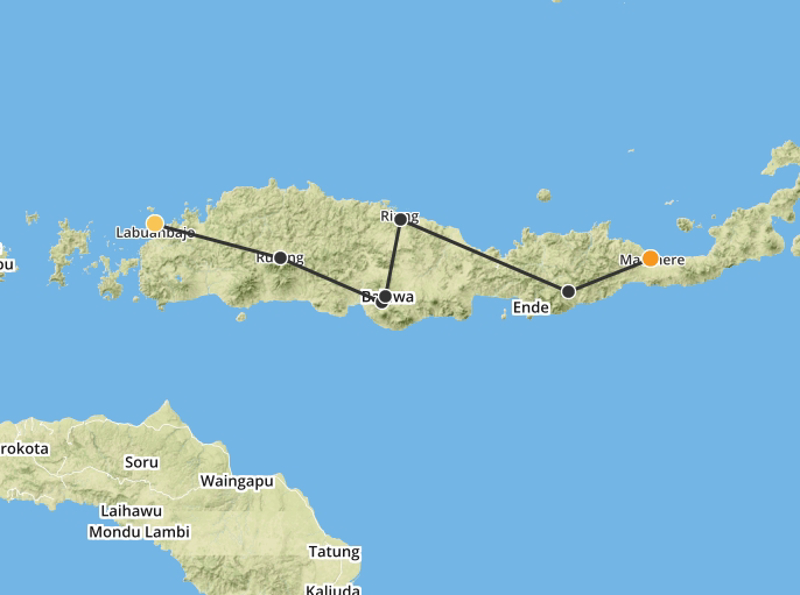
either on my way to or in the agency we have booked with. After the agency employees have spent half an hour searching the street, Rinoy finds it back in my room. I apologise profusely for my complete idiocy, and I buy beers for them as an offering of my remorse. We eat in a simple warung before bed that evening. The Germans would like to see a traditional village before returning to Bali, so the first day of our trip will be spent in unison with them.
Day 33 - 31 May 14
The previous evening, a volcano had erupted on Samba, an island just south of Flores. At dawn, the sky is grey with the volcanic ash, creating a dramatic yellow lighting effect, like a sepia toned photo. A thin film of ash coats our driver's brand new car. On our way, we stop to view the rice fields, arranged in spider web patterns. We wonder if the villagers find it bizarre that this is a tourist attraction.
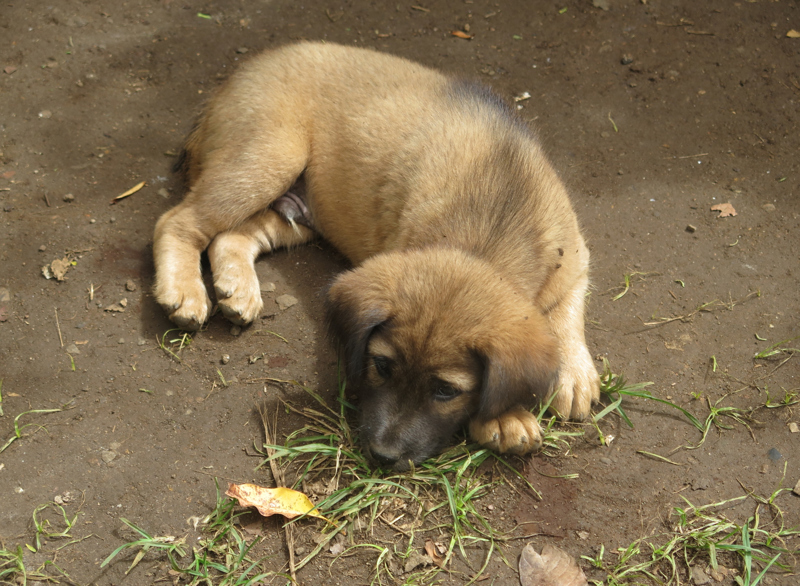
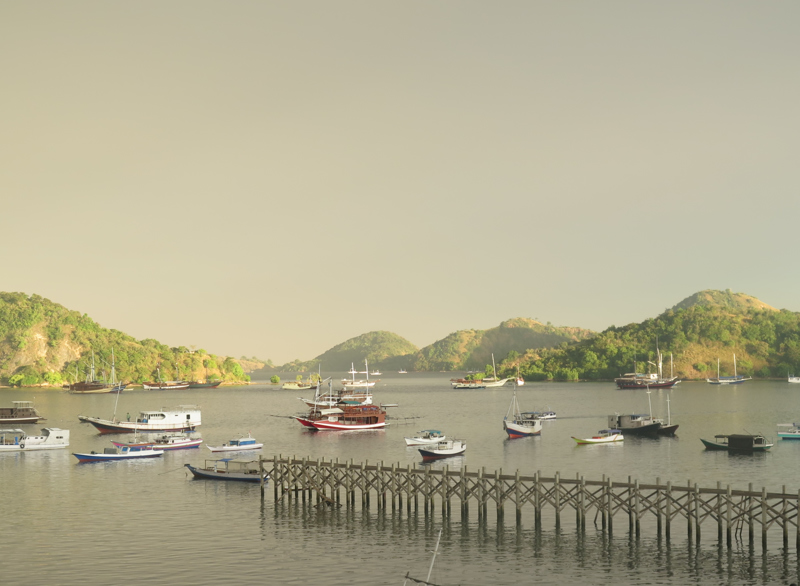
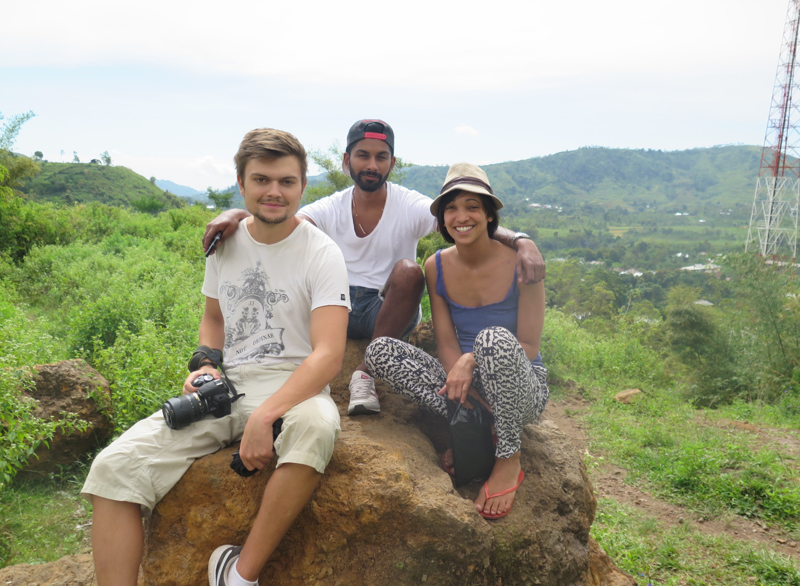
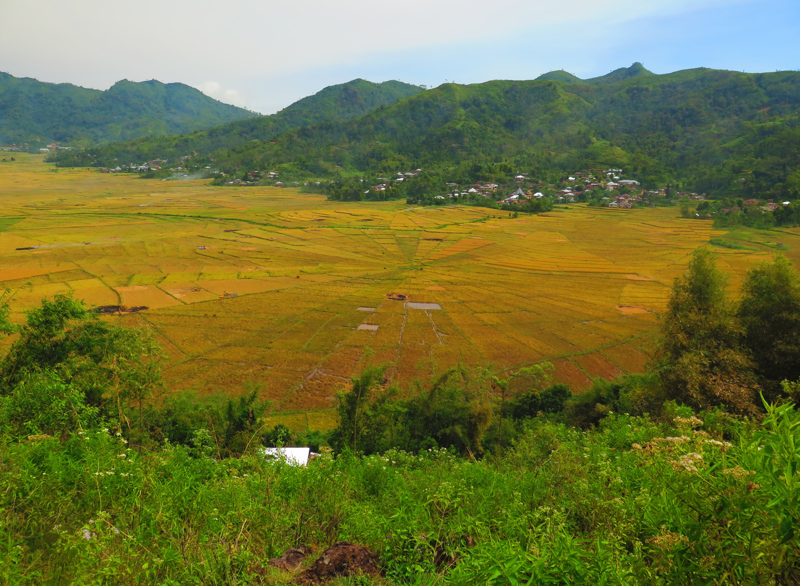
We stop at a traditional village, awkwardly entering their living space. We ask to cross the threshold of one of the traditional houses, a wooden circular structure made with a thatched, cone-shaped roof. We sit down with the family. A friend of the families is visiting who speaks a little English. He is an IT teacher in town, but it's a Saturday so he's not at work.
Legend has it that the stone circular structure in the centre of the village was not made by human hands but unearthly creatures for which he doesn't have an English name. They still sacrifice animals on the stones annually, but we understand this is purely traditional as most of the villagers are Christian. They offer for us to play their drum, as a way of interacting together. We pay a small donation as thanks for letting us enter their home. A boy is playing with his kite outside, and a girl in cute dungarees is twirling a stick. Washing is
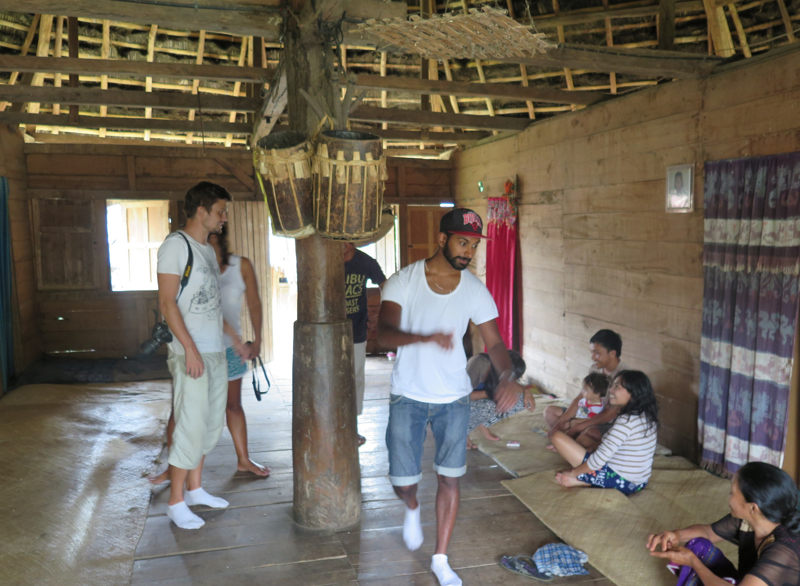
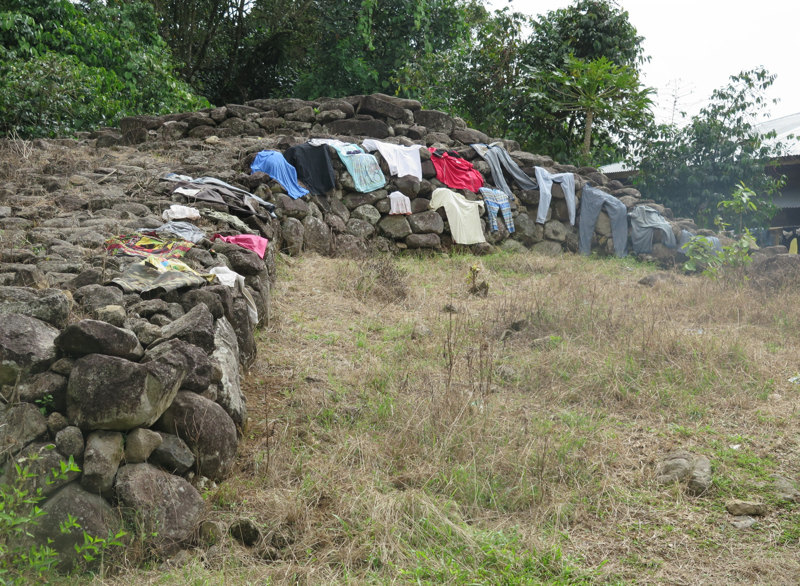
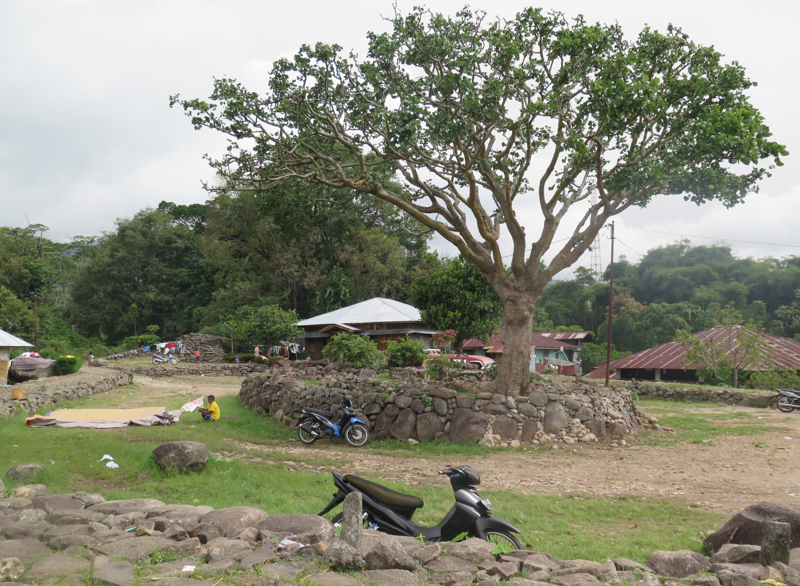
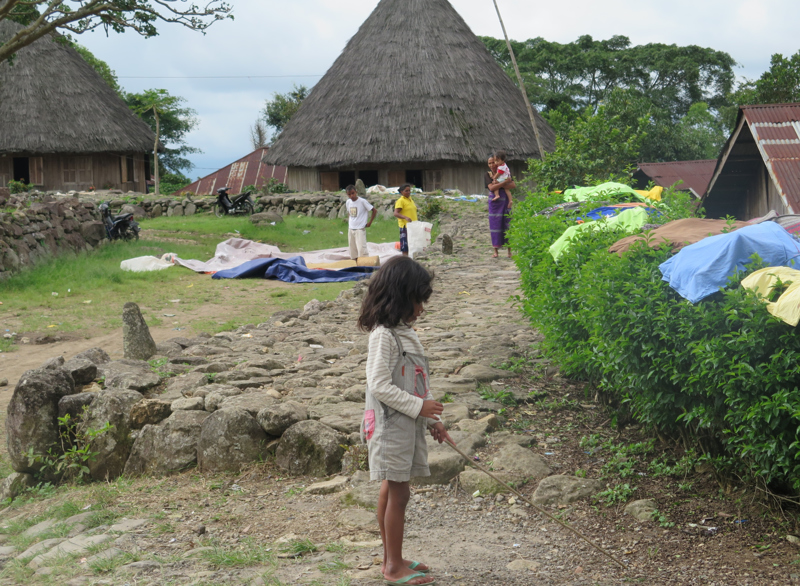
laid out on the stones and rice and coffee beans are drying in the sun. Interestingly, the people in Flores have different features to their Westerly neighbours, many with Afro hair.
On arriving in Ruteng, we visit the local market. Fruits, vegetables, fresh and dried fish, live chickens and spices are sold here. Cobwebs thickly drape the rafters above, like the depiction of a haunted house. A man behind a fish stall chats to me. When he finds out my name he serenades me with an Indonesian song that starts with 'Amelia, oh Amelia'. It's pretty funny, but by the time he’s finished I have lost everyone and it seems impossible to find anyone in the maze. A few ladies shout at me as I walk past and I assume they just want me to take a picture. Eventually I understand that one of them is pregnant and is asking me to rub her belly for good luck. They are pointing at my nose and her bump and laughing - it's as if they wish her child to have a pointy nose like mine. The other end of the market is busier
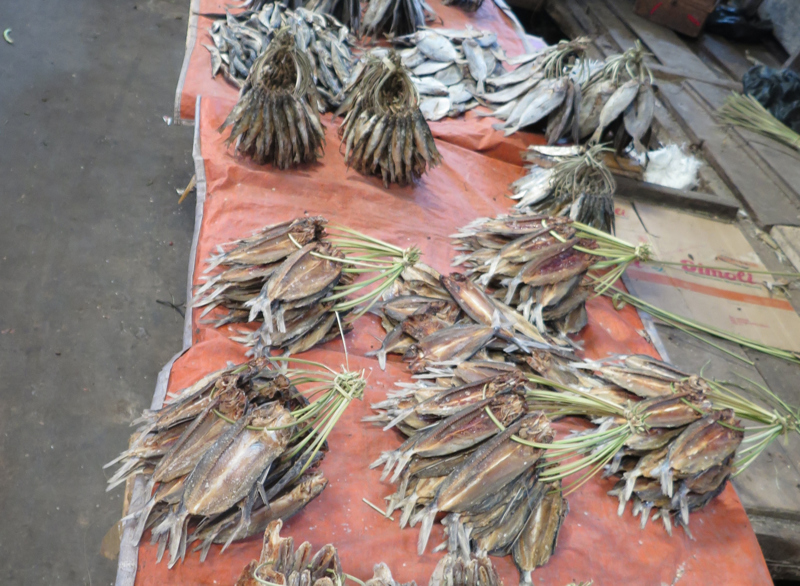
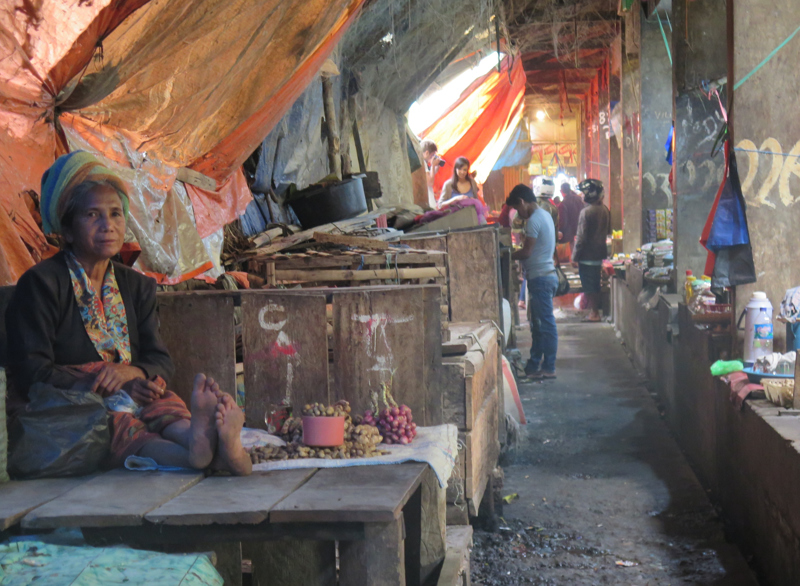
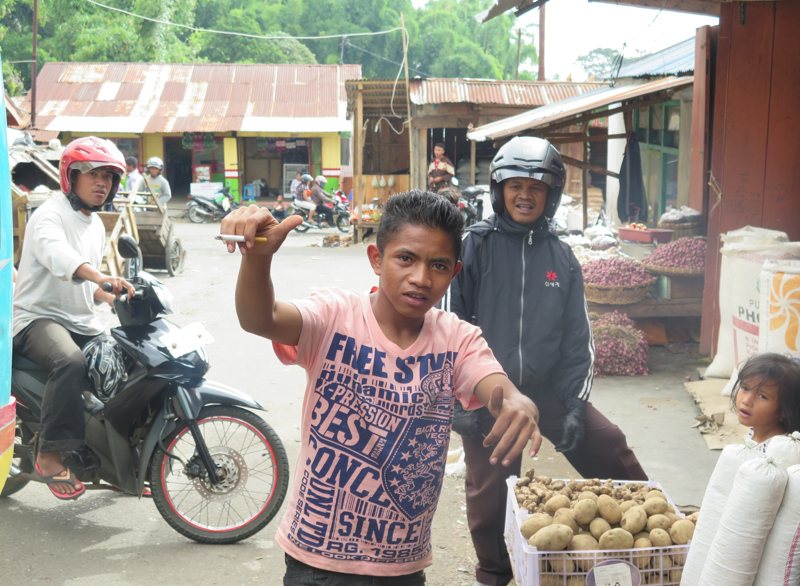
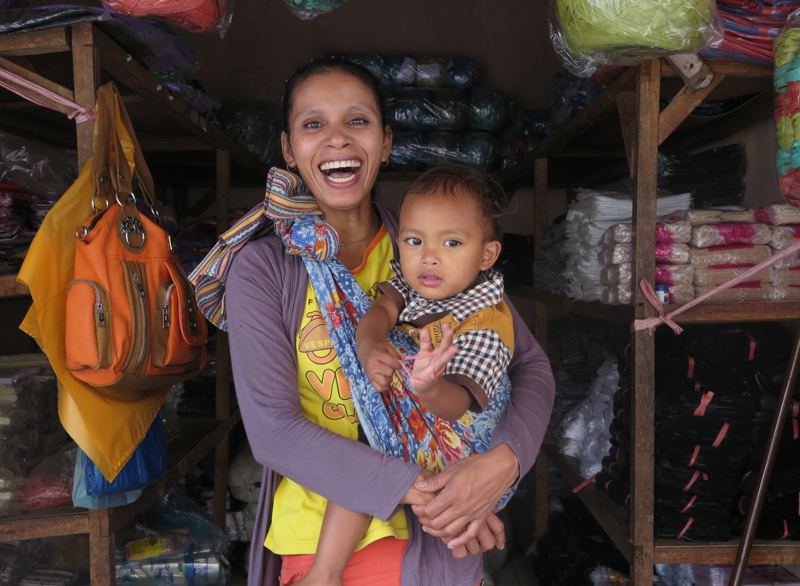
and I become confused and disorientated, with so many people shouting ‘hello’ at me. I find my way out back to the car where I await the others. The German's driver has an annoyed expression on his face and is impatiently waiting to head back to Labuan Bajo. He starts up the engine as soon as they return, so we say a hurried goodbye and invite ourselves to stay at theirs if we return to Bali.
We check into the local convent in Ruteng that rents out clean, large rooms with hot water. It is only 3 pm and there is nothing to do in this small, charmless town. We nap all afternoon, and due to a miscommunication, we keep our driver waiting for an hour who is picking us up for dinner. We feel ashamed that we have inadvertently made him wait so long. We tell him we want cheap food and he says this works for him too, so we stop at a BBQ stall on the side of the road. I order Cap Cay which is delicious, as are the chicken satay sticks.
We've already warmed to our driver who's funny and kind-hearted. He has an uncle in town who has messaged him that evening to find out his whereabouts, but he lies to avoid a long evening of drinking and listening to his tales from when he was in the military. He asks us to be at breakfast by 7 and when we say we might struggle, he offers to put a cockerel in our room as an alarm. We're really grateful that his English is good enough that he's able to provide explanations and to joke with us. His wife is originally from Bali and she moved back 4 years ago to be near her family, taking his son with her. It seems sad to us but he insists he's happy as the rest of his family lives in Flores. His son is 18 and would prefer to live with him, but our driver thinks it's better that he keeps his mother company.
There is a 9 o'clock curfew in the convent.
Day 34 - 1 Jun 14
In the morning, the room is more expensive than expected, but it hardly seems appropriate to barter with the Sister. We leave at 8, passing the nuns all dressed smartly in their pristine uniforms. It's a Sunday and people are heading to church dressed in their Sunday best. We stop off at a crater lake, not dissimilar from the salt lake on our cruise. The path is too overgrown to walk around the lake, so we sit on the sunny steps chatting for a short while. For lunch we eat beef rendang at a roadside cafe. The next stop is in Aimere where a family makes their living from brewing arrack. The children help by filling empty water bottles with the alcohol. There is a fire which heats the liquid from the plant (which looks like a pine cone shaped like a horn), from which the gas rises and condenses - the distilled liquid dripping down a long pipe into a water bottle set underneath. We taste the arrack out of wooden egg cups. It is very strong and we
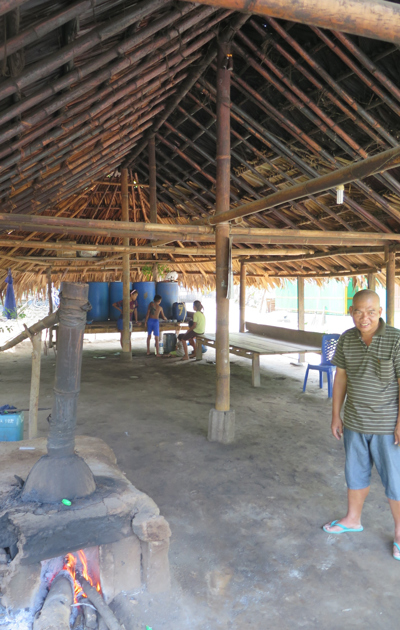
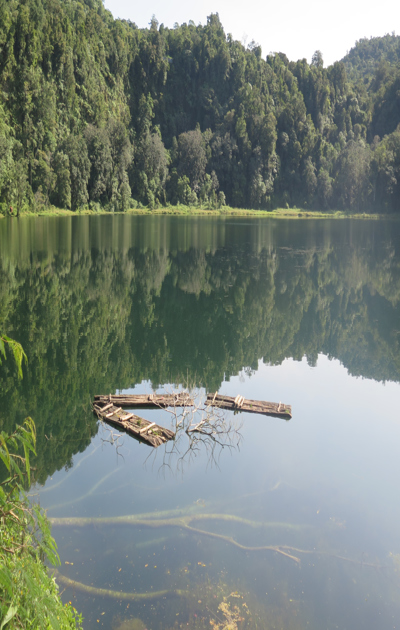
don't wish to buy any. We carry on our drive - the road continues to wind through the mountains. The landscape is green and lush. Cows are tethered up at the side of the road intermittently.
We stop at a traditional village called Wogo. The women of the village are playing volleyball in the square in the middle of the village. Some of the men sit on the porches strumming on their guitar surrounded by children. A lady called Letitia approaches us - her English is good and she offers to take us on a tour. She shows us into her house - the houses are rectangular, made of wood and bamboo with tall triangular thatched roofs. Women weave on the porches. Inside is the main living space, with a traditional wooden chair in front of the entrance into the dark sleeping area behind. Down steps to the right hand side is the kitchen area. There are small kitchen gardens next to the houses. She takes us on a short trek out of the village, past less traditional houses with corrugated metal roofs, through fields of vegetables growing and the jungle, where kids are swimming in the river below, over a bamboo bridge to old Wogo. On the way she points out different plants and their uses: papaya - its leaves a medicine for malaria; a plant which she pulls out its root to show us galangal; leaves used as vegetables or flavourings. She says when the bamboo plant has been cut, its stump fills with water, which attracts mosquitoes.
Old Wogo is now overgrown, but the stonewall around the village is still visible. There are stones standing in the earth, but we are unclear as to their original purpose. There is a large slab of stone laid, which was used to sacrifice animals on. On our return journey she asks us to give some money directly to her for the tour – she tells us that the leader of the village, who receives the donations from tourists, is an alcoholic and he will waste all the money on his arrack addiction. She's already told us that she usually lives in Bajawa to make money
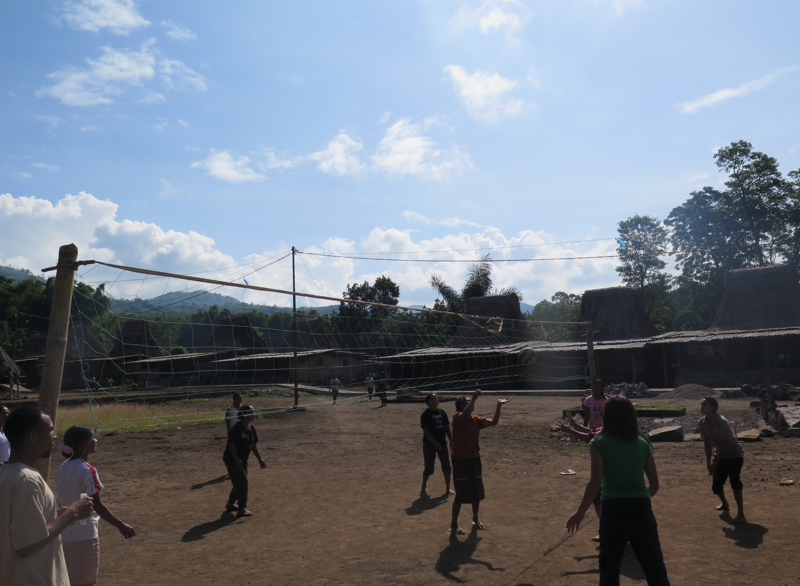
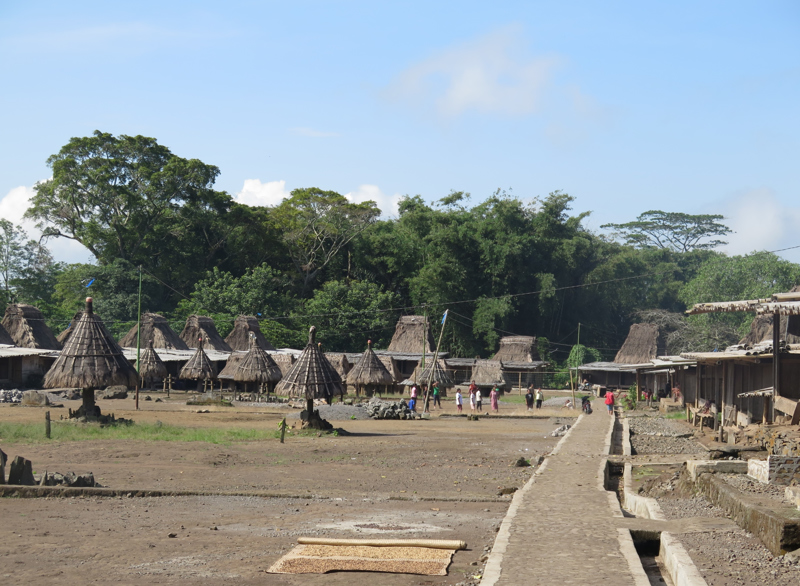
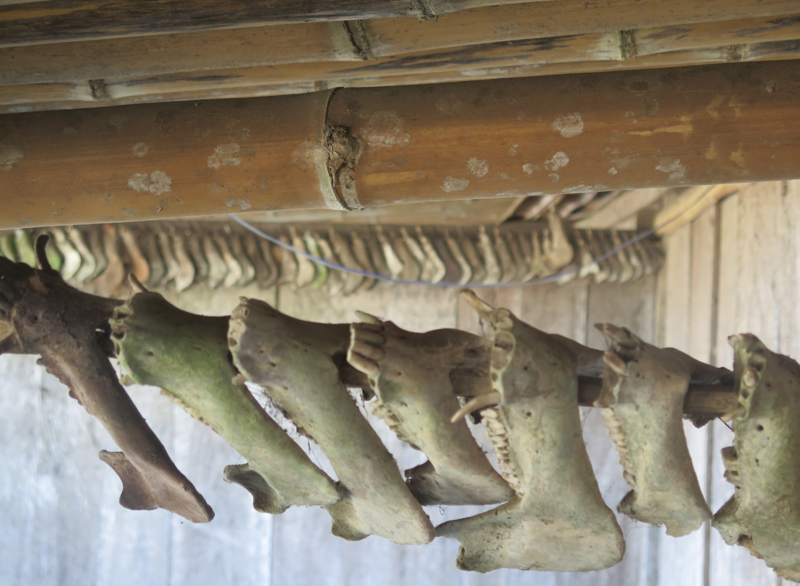
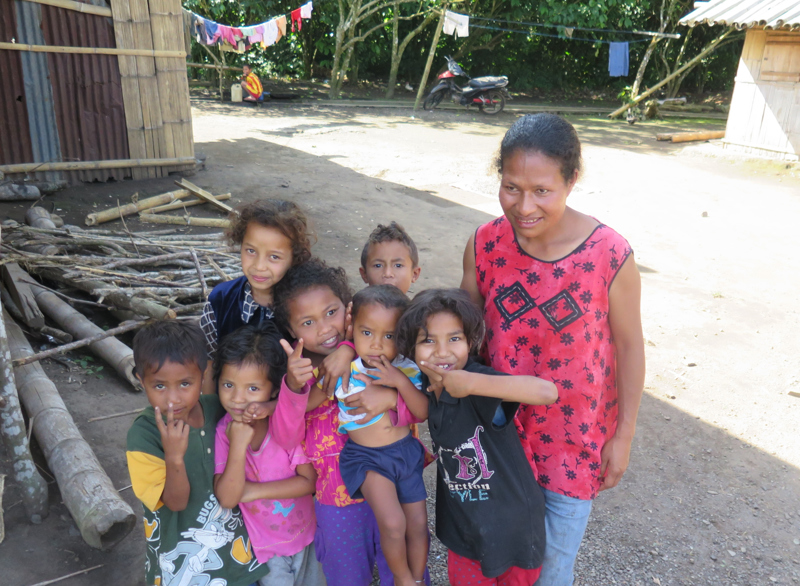
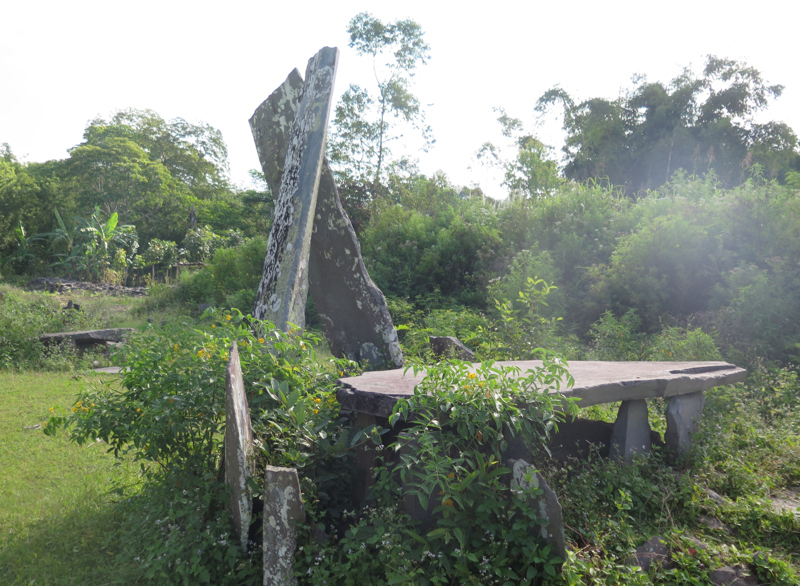
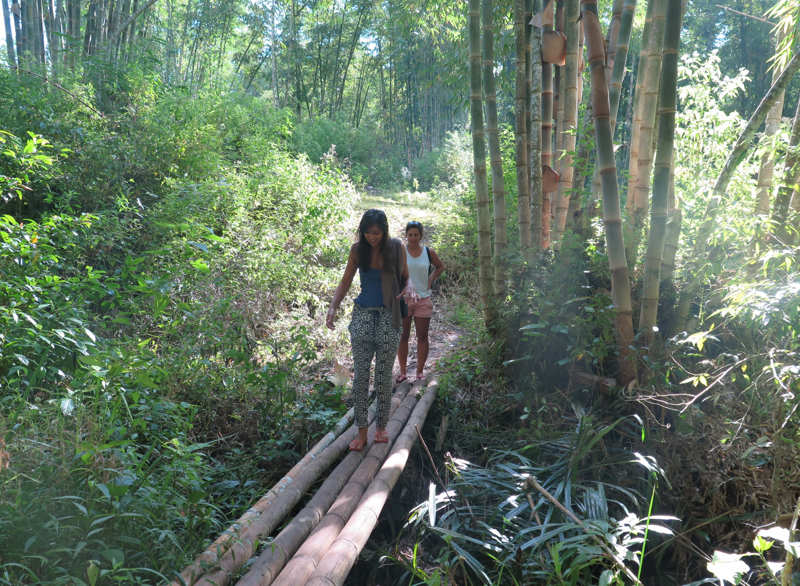
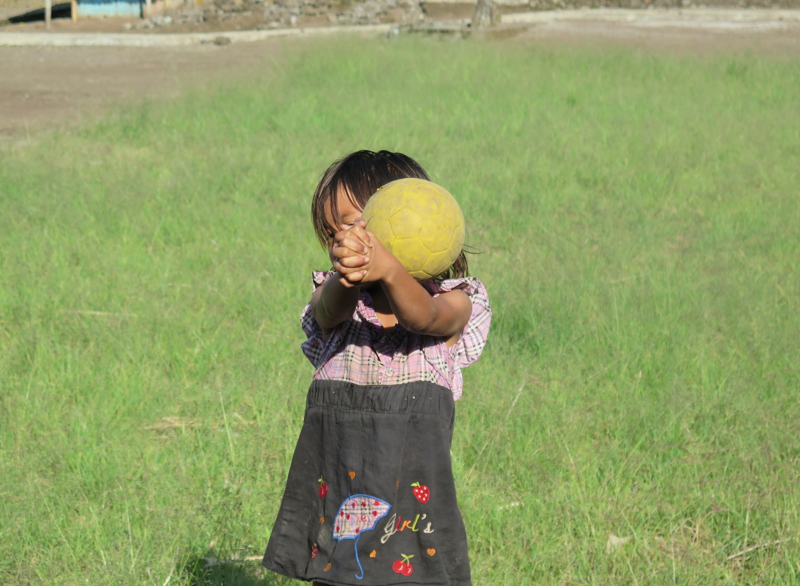
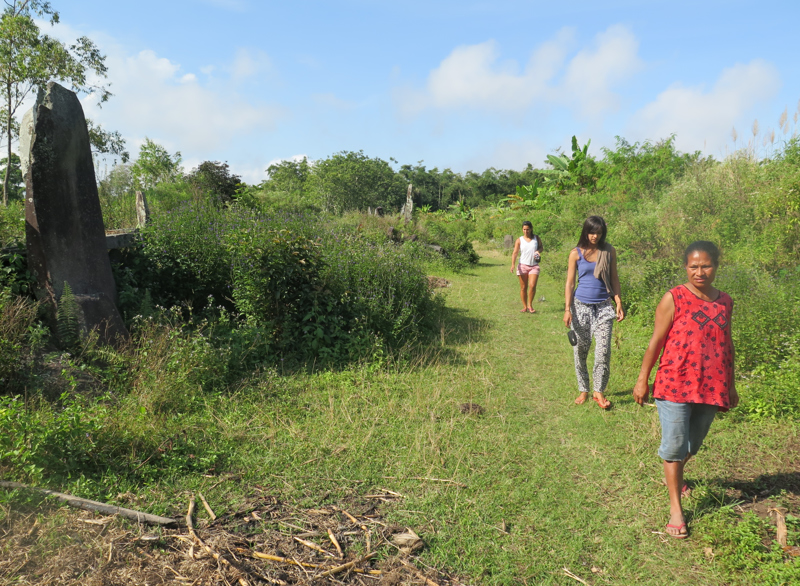
for her 2 children as her husband left her for another woman, but she is back living in the village for a short period to nurse her sick mother. She clearly has an entrepreneurial streak - she makes money from the tourists using her language skills while the rest of the villagers relax.
In Bajawa, we stroll around the small town, stopping for some cheap snacks at a street stall - fried Tempe, and banana wrapped in pastry. A monkey tamer is in town entertaining the people. The little monkey looks forlorn. He is dressed in a red waistcoat, green trousers and a top hat, and he is holding a tin pot for tips. His neck is attached to a chain and he is being forced to dance on his hind legs to the beat of a drum - the would-be happy tune resonates with a sinister ring. The villagers crowd around laughing. There is a mosque in town but the majority of people are Catholic. We head to Edelweiss hotel as darkness falls, although it is still early.
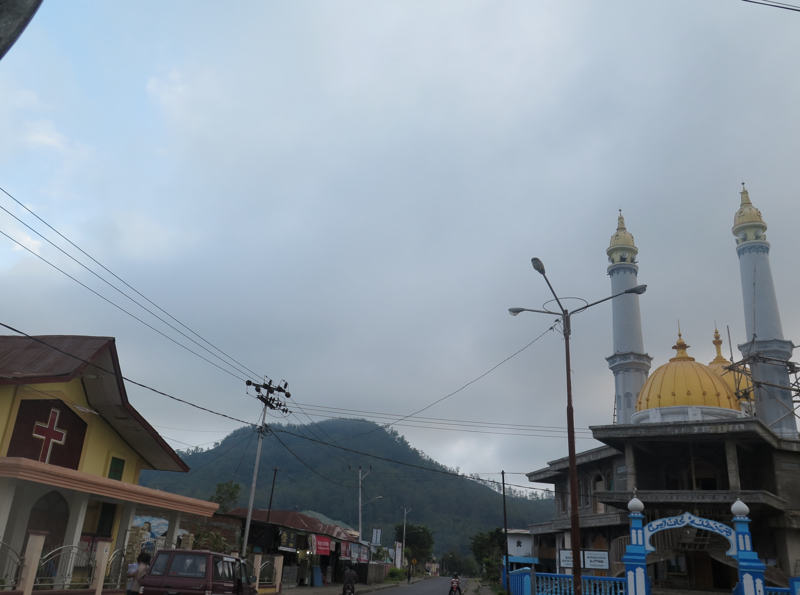
Day 35 - 2 Jun 14
We visit 2 traditional villages in the morning. At Luba, the village slopes downhill, the houses shaped in a large rectangle around the central courtyard, tiered with steps down to each next section. Graves cover areas of the courtyard, decorated in pale blue and white diamond-shaped flat stones, arranged in the shape of a cross. A line of small huts is arranged across the centre of the courtyard. The women’s huts are large enough for 1 person to enter. The men’s huts are structures not dissimilar to pub garden umbrellas but made from wood and thatch. We haven't yet worked out what these were traditionally for, although the woman in the previous village had tried to explain. We sit on the porch of someone's house, vaguely attempting communication. The 15 year old boy keeps repeating 'I don't no speak English' and laughing - it seems strange that he's not at school. The slightly older guy asks me to take a picture of him and Hannah sitting on the traditional chair, while he puts her sunglasses on and drapes his arm over her shoulder. A man is sitting with his legs stretched out upon the ground in the small room behind the porch, praying fervently to a small shrine of mother Mary and a cross in front of him. He smiles and asks us our names. His leg is lying on a wooden plank and other wooden pieces have been attached around his ankle so it is locked in. We try and ask him what has happened. The other guy points at him and shakes his fists. We speculate that perhaps he has been put under house arrest by the leader of the village for committing a crime. We say goodbye and continue around the houses.
A cute little girl is sitting in the porch of the house with whom we should leave a donation. On seeing us approach, she places the guest book and pen on the desk. We donate 5,000 each and are about to leave, when a woman comes out of the house. In her hand is 10,000 IDR, not the 15,000 IDR we had donated and she appears to be angry and starts to raise her voice at us. As we cannot understand, we simply walk away.
An old lady, who we had previously noticed sitting on her porch deep in prayer, now seems to be chasing us down the path which leads out of the village. We stop to try and understand what she wants. She crosses her body, holds her hands in prayer, presses one hand against both her ears alternatively and then makes a sleeping motion, muttering continuously under her breath. She takes my hand in hers - it is covered in patches of red, which I hope comes from the plant the ladies chew, rather than blood. She must be senile, but I can't shake the impression that she is cursing me. We place 5,000 IDR into her hand and continue walking down the hill. She follows for a short while but then turns back around.
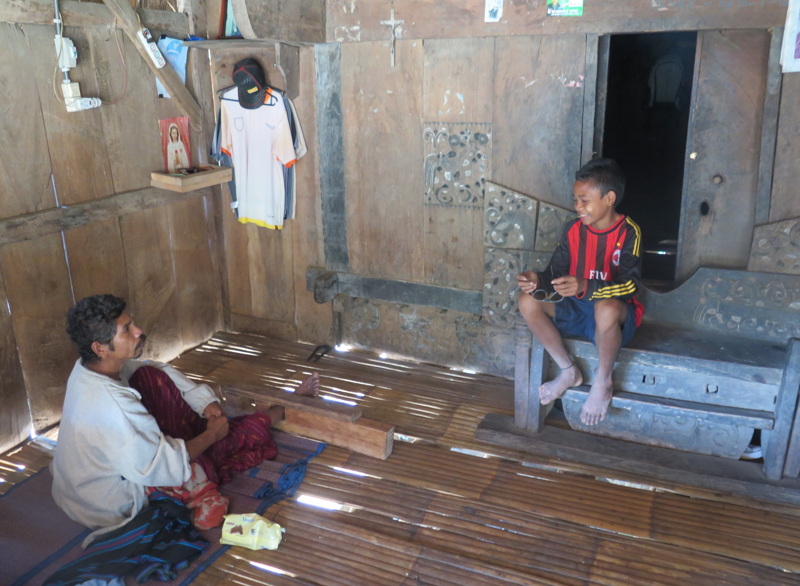
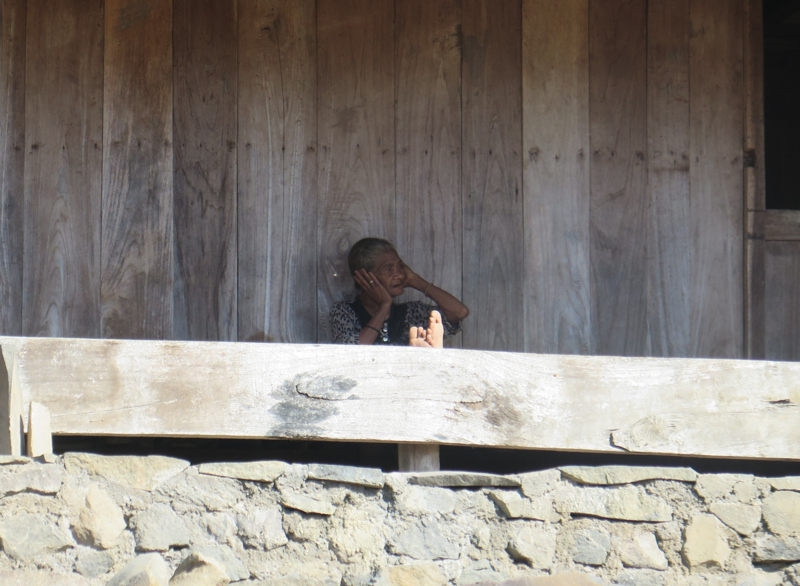
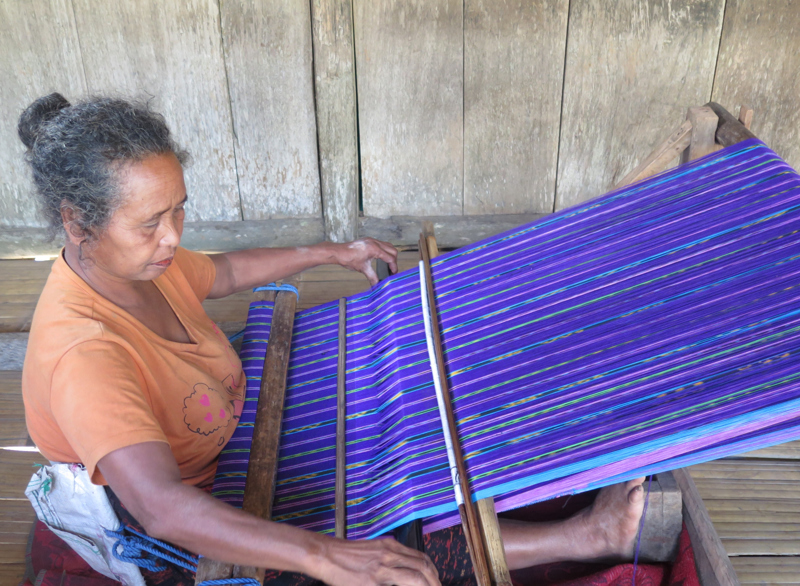
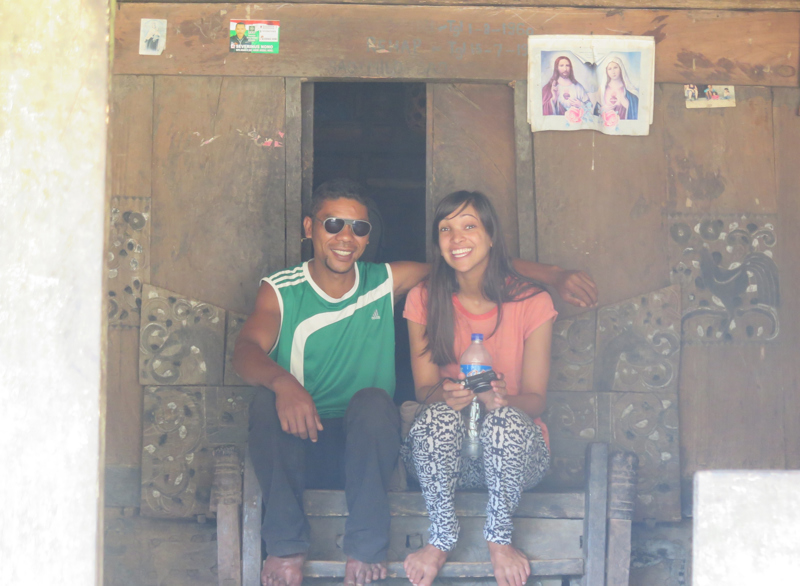
Bena, is only a short walk away. It is similar to the other 2, but larger, older and more impressive. There are still megalithic stones and sacrificial tables in its centre, similar to old Wogo. At the top is a panoramic view, overlooked by the volcano Mt Inerie. Two puppies play in the sunshine scurrying across someone's grave - a lady comes out of her house to shoo them away. A little girl tries to sell us vanilla or macadamia nuts. We buy the latter since she's so sweet. Two young boys want a photo taken. They pose with their 2 first fingers in a downward V - they actually do look pretty cool. Lots of ladies are weaving, but nobody is trying to force us to buy their products, which are hanging in pretty colours on the rafters in front of their porches.
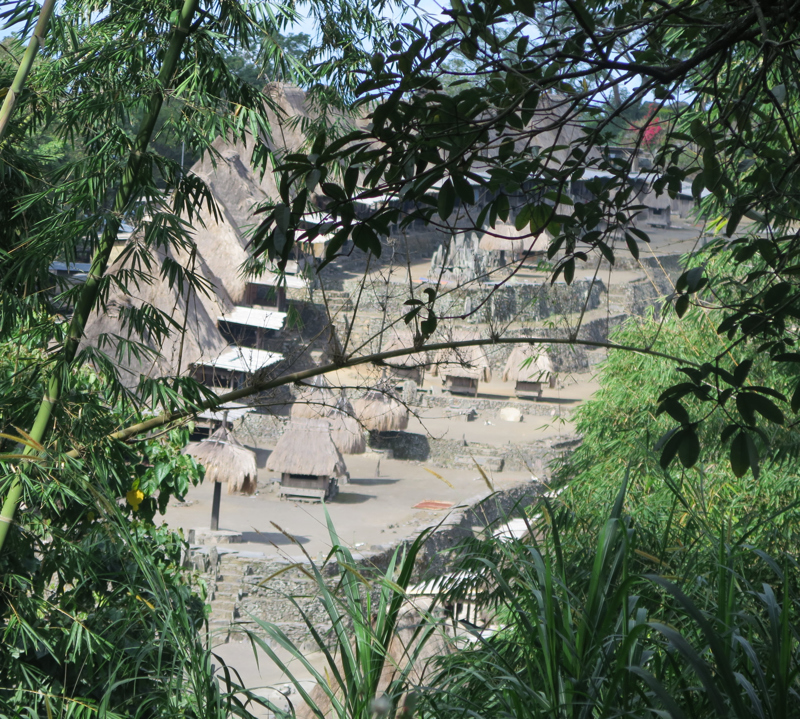
In Bajawa, we stop to pick up food for later as there will be no restaurants on the way to Riung. The food is wrapped up in little brown parcels, tied with an elastic band. Our next stop is the hot springs. There is a large pool, but it looks slightly decrepit now, so I wonder when it was originally built. We step into the warm bath as the heavens open. This is definitely one of my favourite sensations - in water in heavy rain, watching the drops bounce off the surface, creating mini ripples, feeling it on my hair and face while the rest of my body lies submerged. The other hot spring is in its natural location. The red copper rock has been half caked in a bright green film of sulphur, which looks pretty in the sunshine with the white water flowing over it. Babs sits in a pool with a small waterfall rushing over her shoulders - it's just like a Jacuzzi. The heat from the water has made me feel dizzy and I head back to the car to sit in the
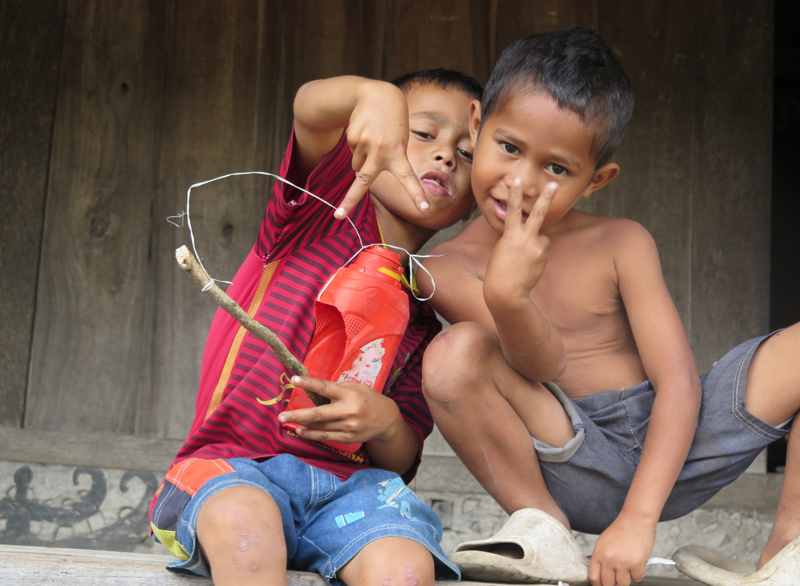
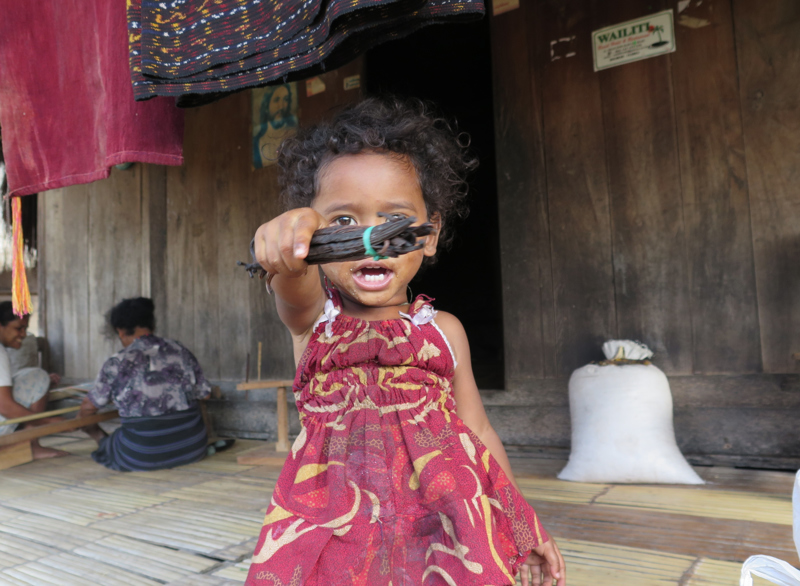
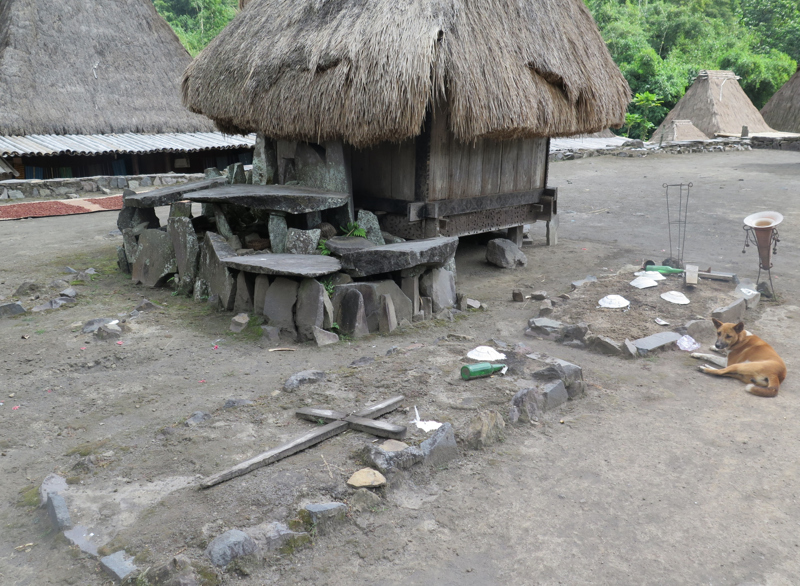
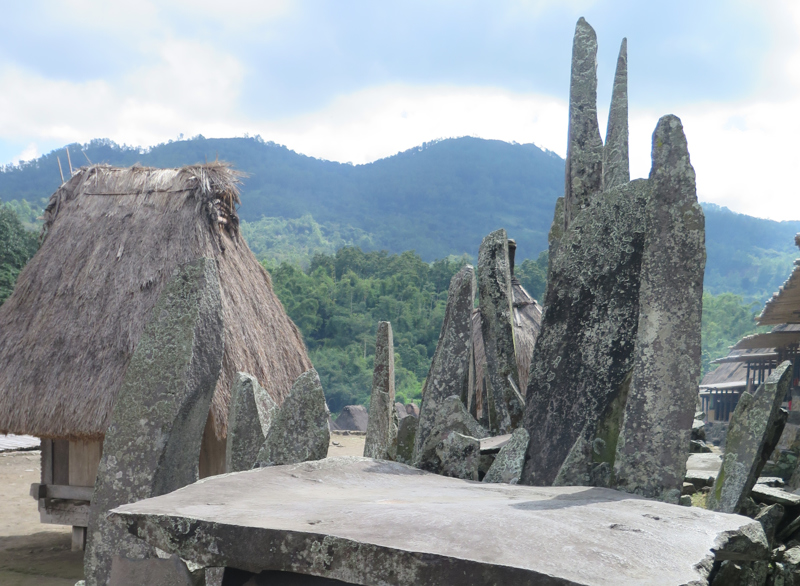
shade. We eat our takeaway lunch with our hands, on a wooden bench, giving our leftover chicken and rice to the dog, while our driver flirts with the woman selling tea.
From here, it's a 3 hr drive to Riung. Although the distance itself is not far, the road is thin, windy and full of potholes. It makes me feel a little queasy. In Riung, we stay at Nirvana. Little shacks with thatched roofs surround a large, pretty although slightly overgrown garden. The employees are busy creating new gravel paths. There are flowers and shade-creating trees. I have cramps in my belly and bowel problems, so I stay in the hut while Hannah and Babs join Theo for dinner. I feel a fever coming on that starts to worsen. My skin is hot, but covered in goose bumps and I can't get to sleep. I experience the same two sensations that I remember having as a kid with a temperature. One is that my bed has moved from underneath me and my legs are sloping downwards from my body with the pull of gravity; the other, that my fingers, lying heavily on my body, are simultaneously 10 times their real size and as thin as a needle. I have been reading a novel, in which there is a discussion regarding curses. One of the characters suggests they are real if you believe in them. In my feverish state I cannot help but recall the old woman from the village with mistrust. I take ibuprofen throughout the night to bring down my temperature and manage to sleep on and off.
Day 36 - 3 Jun 14
In the morning, I feel much better. My temperature is gone but I still feel weak and decide it wouldn't be sensible to join the boat trip. I'm not hungry but I eat a piece of bread for breakfast and go back to bed. At about 10, my driver disrupts my sleep to drive me to the bank to get cash out to book flights. Irritatingly, there is only 1 ATM in town, and it is empty of money. We understood that we had already reserved our flights before we left Labuan Bajo but there has been confusion or incompetency from the man at the tour agency. Everyday the flight prices increase.
For lunch, our driver really kindly buys me a vegetable soup, which he brings to my hut in a glass bowl with a lid he has borrowed from the restaurant. A light chicken broth filled with cabbage, tomato, green beans, potato and tofu and a green citrus scented leaf for flavouring. It's delicious. I sit on the porch in the afternoon sun watching two kittens playing - mimicking each other's movements. I shower in our outside bathroom, beneath the blue sky.
In the evening, my legs still feel jellylike and are a little weak, but I join the guys for dinner, along with the Danish guy who joined them for the boat trip. He seems nice enough, but he freaked the girls out a little at the beginning of their trip after attempting unsuccessfully to snorkel for the first time, suggesting it must be comparable to giving fellatio - his distasteful humour unappreciated. We are the only people at the little restaurant. Cafe Del Mar is a simple hut in a clearing amongst the trees with colourful fairy lights decorating its front. The music is turned on as we arrive and an open fire started on which to cook our fresh fish. We walk the short distance back to Nirvana beneath the light of a crescent moon. Before we sleep, we leave the outside porch and toilet light on, as requested by the owner. Apparently there have been previous incidences of theft, so they want to have visibility to any potential intruders.
Day 37 - 4 Jun 14
I'm still not feeling 100%, and Han hasn't yet recovered from her cold. Sitting in an air-conditioned car on a windy road doesn't help. We drive through to Moni, stopping at the Blue Stone beach. The large pebbles are a pale turquoise colour. They are being sorted into sizes by people on the side of the road to be sold on to serve as garden decoration. Our driver buys a sackful. It seems a shame, as the beach used to be completely covered in blue stones, but now expanses of sand are visible. We expect the name of the beach will become redundant. I wonder along the black sand, which twinkles with a frosting of glitter. Each footfall sends little grey crabs scurrying sideways across the sand down into the nearest hole. I am approaching a group of guys so I decide to turn back rather than being accosted alone this far along the beach. One of the guys chases after me and asks me to take a picture of him. He makes me feel uneasy as he is holding a block of wood in one hand and keeps glancing nervously to his left. He tells me his name and shakes my hand, but doesn't loosen his grip, requesting a kiss by pointing his finger to his cheek. I pull my hand away, say 'no' and walk off - thankfully he doesn't follow me. I am probably being unnecessarily paranoid but I feel glad I'm not travelling alone. We stop in a restaurant for lunch. It appears Han and I have not received our correct order - they laugh and swap the food over. We're still confused. Hannah's Asparagus soup contains prawns and my chicken soup has chopped up frankfurters, potato, pasta, vermicelli noodles, and peas, carrots and sweet corn from a frozen mix, with no sign of chicken. It's a little unexpected and an odd combination of textures.
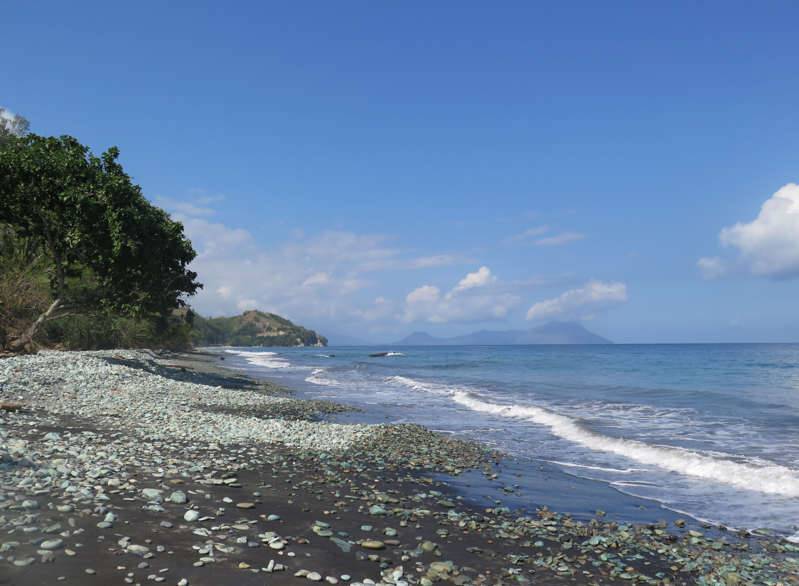
We arrive in Moni at dusk. There is confusion in the first place we will stay in - an employee has agreed to 250,000 IDR, but has to backtrack as the owner will accept nothing less than 400,000 IDR. It's too expensive so we find another room, which isn't as nice and clean, at Watunga Bungalows. At dinner, I try the Special Moni Cakes. They're made from potato mashed with garlic and onion, fried and sprinkled with a little cheese.
Day 38 - 5 Jun 14
We wake at 4.30 and set off up the hill in the car shortly after. It's dark and there's a heavy layer of mist the higher we climb. It's only a 40 minute walk up to the crater lakes, but when we arrive, the lakes aren't visible through the clouds. We return to the car disappointed and ask if we can return in a few hours after breakfast in case the sky has cleared. We stop to view a picturesque waterfall on the way down, but the water isn't tempting to swim in and it’s cold in the mountains in the morning. We eat breakfast in the guesthouse. The rain, since it's falling on the metal corrugated roof above us, sounds especially thunderous. It's not particularly promising. We pack our bags and at 10 head to the car. Our driver, who wishes to reach Maumere as soon as possible to finish his day after the early start, pretends to misunderstand our earlier request. Fortunately Hannah notices we're driving in the wrong direction. It's still cloudy, but gaps of blue are seeping through so we're hoping there's a chance the mist has cleared, but as the driver thinks it's unlikely he's clearly annoyed.
We walk back up again, and this time we can see the lakes below - a breathtaking sight. The first lake shines black with a faint hue of rusty red where the liquid meets the rock around the edge. Sitting next to this crater, with a jagged rocky wall dividing the two, is the largest lake coloured a pastel mint green. The smallest lake on the other side of the viewing point is dyed dark green with a hint of turquoise. It is just as explained to us - like cauldrons filled with thick liquid paint. The colours of the lakes change like a chameleon so it's not possible to know exactly what to expect on arrival. A lady has lugged a thermos of hot water to the highest viewing point. She sells homemade ginger coffee. It is delicious. We sit sipping the spicy drink and admiring our surroundings.
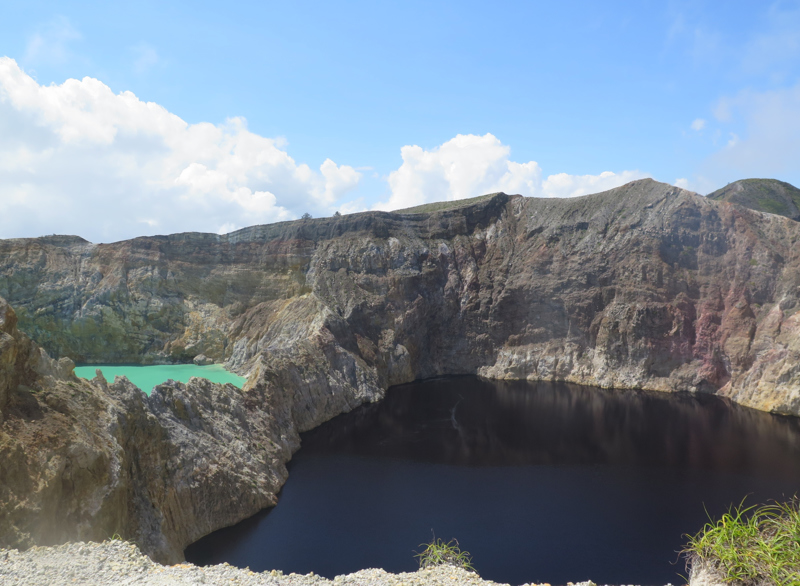
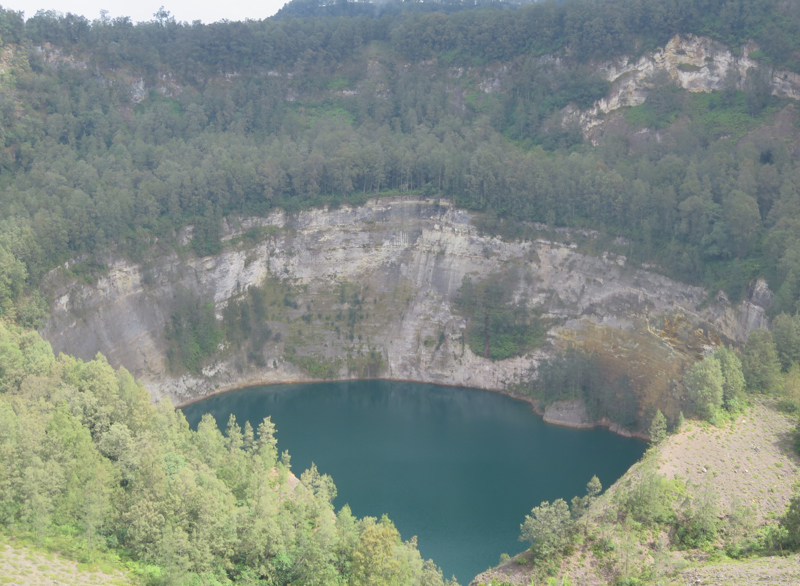
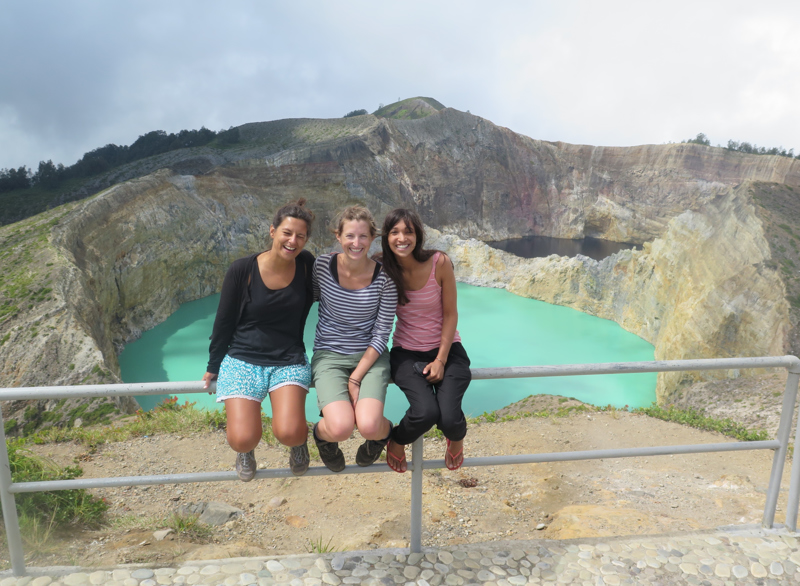
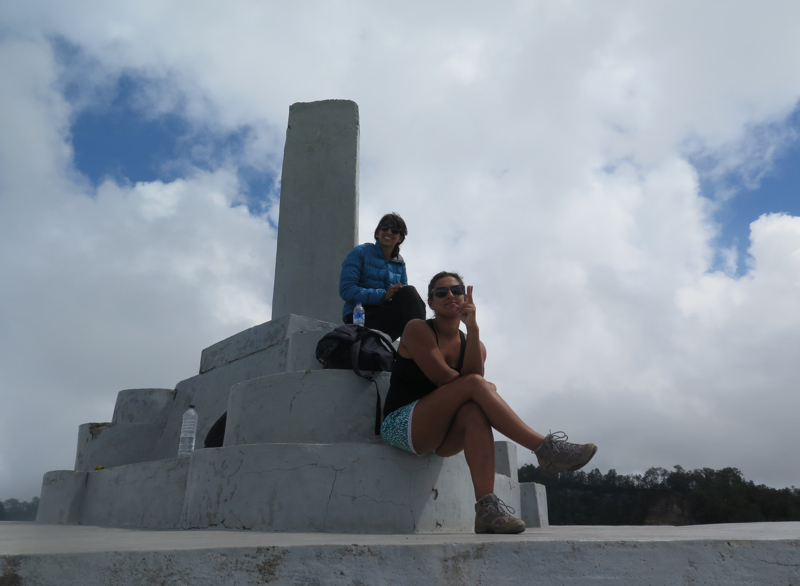
Theo seems a bit grumpy when we reach the bottom - we're not entirely clear whether it's just tiredness or he's fed up with us, but he's no longer the same jokey character we encountered at the start of our journey. All in all, we've decided that hiring a driver, although convenient, is not a fulfilling way to travel for an extended period. It feels like there is less freedom as we're expected to keep to a schedule and you miss the experiences you encounter and people you meet when travelling on public transport.
Halfway through the drive, Theo is tired, so he stops for a coffee while we take a stroll along Pago beach in the afternoon sunshine watching the waves crash against the shore. Little simple huts line the beach - we assume they house fishermen and their families and we wonder how many islands that are now built up with resorts, had to force locals out of their homes in the past.
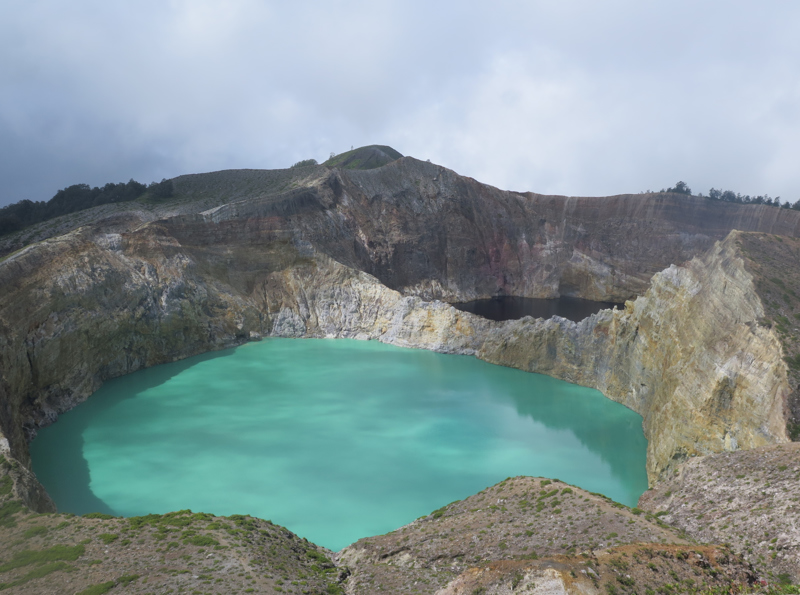
When we arrive in Maumere, accommodation choice is limited. We stay in Beng Goan 2, in a dirty room with no shower, but the sheets are clean. A rat scurries across the walkway in front of us while we're being shown the options. We eat in a restaurant recommended by a local behind the football stadium. We don't feel particularly safe in this town - the local men stand around in groups staring, so we choose to pay for a taxi back.
Day 39 - 6 Jun 14
We spend a while searching for somewhere to eat breakfast. There aren't a huge amount of options, so we buy oranges, coconut and battered bananas from the Pasar opposite us. It sells the normal array of vegetables, fish and meat, but there's not much in the way of fruit. We eat on the street ignoring the stares, and we're happy at midday when our taxi appears to transport us out of this town, which lacks character and cleanliness. We drive to the aiport to catch our flight back to Bali, where we must return to pick up our passports.
1.
Arrival in Jakarta, Pangandaran, Jogjakarta, Malang
2.
Volcanoes - Mt Semeru, Mt Bromo, Mt Ijen
3.
Ubud - a brief Sojourn
4.
Gilli Trawangan - white beaches and turquoise waters
5.
Boat Cruise - past the Komodo Dragons
6.
Flores - traditional villages and Mt Kelimutu
7.
Kuta, Lombok
8.
Baliem Valley - trekking in the mountains and meeting the Dani tribes
9.
Sentani - the festival and the lake
10.
Tana Toraja - Funerals and Burial Sites
11.
Kuala Lumpur - back in civilisation
12.
Cameron Highlands - trekking and tea plantations
13.
Georgetown, Penang - street art and crumbling mansions
14.
Banda Aceh and Pulau Weh - contending with Ramadan; Scuba Diving and snorkelling in paradise
15.
Lake Toba - the Batak people
16.
Bukit Lawang - Orangutans
17.
Unawatuna
18.
Volunteer Sri Lanka - Week 1
19.
Volunteer Sri Lanka Week 2
20.
Kandy and the East Coast
21.
Ella and Colombo
22.
Volunteer Sri Lanka - final week
23.
Earthbound Expedition - Kathmandu, Poon Hill and Chitwan National Park
24.
Back in Kathmandu
25.
Langtang - solo trekking
26.
Kathmandu to Varanasi